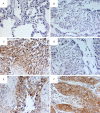Downregulation of P38 phosphorylation correlates with low-grade differentiation and proliferation of lung squamous cell carcinoma
- PMID: 28469797
- PMCID: PMC5411940
Downregulation of P38 phosphorylation correlates with low-grade differentiation and proliferation of lung squamous cell carcinoma
Abstract
Background: P38MAPK has been investigated as a tumor-related signaling molecule because of its apparent association with tumorigenesis. This study aimed to investigate P38MAPK expression and its role in lung squamous carcinoma (LSCC).
Methods: The expression of P38MAPK and phosphorylated P38 (P-P38) in LSCC tissues and cells was examined by Western blot, real-time PCR, and immunohistochemistry. The influence of P38MAPK inhibitor SB203580 on the proliferation of LSCC cells was detected by MTT and flow cytometry.
Results: The expression of P-P38 in LSCC tissues and cells was lower than that in cancer-adjacent normal tissues and normal bronchial epithelial cells (P<0.05). In addition, the expression of P-P38 was downregulated in LSCC tissues of poor differentiation, stages III and IV, and with lymph node metastasis compared with the LSCC tissues of well differentiation, stages I and II, and without lymph node metastasis (P<0.05). Moreover, the cell proliferation of LSCC SK-MES-1 cells treated by P38MAPK inhibitor SB203580 significantly increased in a concentration-dependent manner compared with that of SK-MES-1 cells without SB203580 (P<0.05). The inhibition of P38MAPK promoted the transition of the S phase to the G2 phase.
Conclusions: P-P38 was poorly expressed in LSCC tissues and cells. Its low expression was correlated with low-grade differentiation, lymph node metastasis, and advanced stage of LSCC. Inhibition of P38MAPK expression could significantly increase the proliferation of LSCC cells by promoting the transition of the S phase to the G2 phase.
Keywords: LSCC; Lung squamous carcinoma; P-P38; P38MAPK; proliferation.
Conflict of interest statement
None.
Figures




Similar articles
-
Cyr61/CCN1 overexpression induces epithelial-mesenchymal transition leading to laryngeal tumor invasion and metastasis and poor prognosis.Asian Pac J Cancer Prev. 2015;16(7):2659-64. doi: 10.7314/apjcp.2015.16.7.2659. Asian Pac J Cancer Prev. 2015. PMID: 25854342
-
[Correlation of p38 mitogen-activated protein kinase signal transduction pathway to uPA expression in breast cancer].Ai Zheng. 2007 Jan;26(1):48-53. Ai Zheng. 2007. PMID: 17222367 Chinese.
-
MicroRNA-4497 functions as a tumor suppressor in laryngeal squamous cell carcinoma via negatively modulation the GBX2.Auris Nasus Larynx. 2019 Feb;46(1):106-113. doi: 10.1016/j.anl.2018.05.005. Epub 2018 May 26. Auris Nasus Larynx. 2019. PMID: 29843929
-
MicroRNA-101 is a potential prognostic indicator of laryngeal squamous cell carcinoma and modulates CDK8.J Transl Med. 2015 Aug 19;13:271. doi: 10.1186/s12967-015-0626-6. J Transl Med. 2015. PMID: 26286725 Free PMC article.
-
[Study of the relationship between early growth response gene 1 activity in p38 mitogen-activated protein kinase pathway and epirubicin resistance of human breast carcinoma cells].Zhonghua Bing Li Xue Za Zhi. 2009 Jun;38(6):408-13. Zhonghua Bing Li Xue Za Zhi. 2009. PMID: 19781349 Chinese.
Cited by
-
Comprehensive analysis reveals COPB2 and RYK associated with tumor stages of larynx squamous cell carcinoma.BMC Cancer. 2022 Jun 17;22(1):667. doi: 10.1186/s12885-022-09766-z. BMC Cancer. 2022. PMID: 35715770 Free PMC article.
References
-
- Biaoxue R, Shuanying Y, Wei L, Wei Z, Zongjuan M. Maintenance therapy of gefitinib for non-small-cell lung cancer after first-line chemotherapy regardless of epidermal growth factor receptor mutation: a review in Chinese patients. Curr Med Res Opin. 2012;28:1699–1708. - PubMed
LinkOut - more resources
Full Text Sources
Miscellaneous
